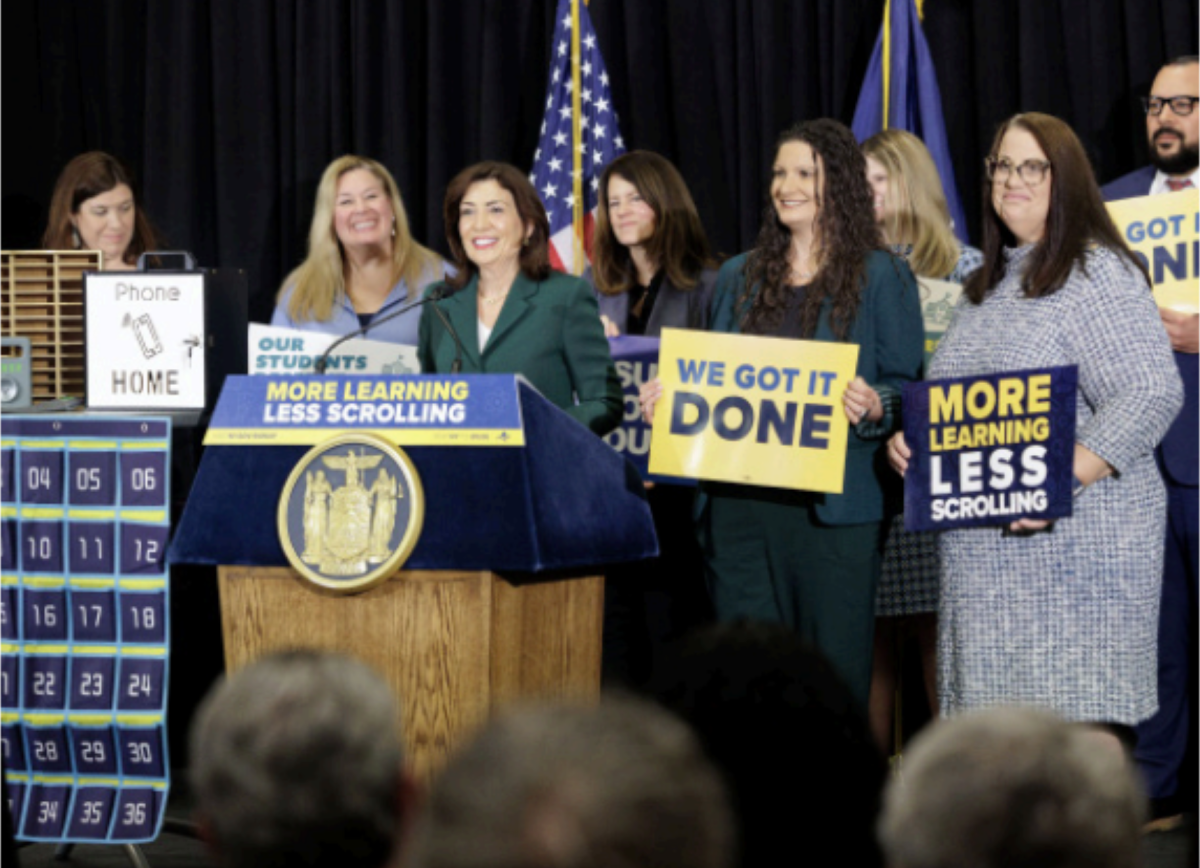Across the U.S., debates over book banning have become increasingly heated. In an age when books are disappearing from shelves across the country, New York is taking a different approach—by proposing a bill to prevent the banning of books within library systems. But what exactly does this mean, and how would it impact schools like MHS?
Ms. Spellman, a Mamaroneck High School English teacher, explains that removing a book usually means relocating it or deciding it’s not suitable for a specific age group, while banning a book “completely cuts off any chance of literature being seen.” Ms. Spellman reflects how this idea of banning is a form of censorship.
Mrs. Pantginis, the librarian at MHS, adds that a “book challenge” is when a community member raises a complaint, often believing a book is inappropriate for their child. In contrast, a book removal may occur when a book becomes no longer “culturally sensitive.” These distinctions, shared by both educators, show the nuance in how books are evaluated, and how their views, though slightly different, align on the importance of access to literature.
MHS student Helen Romita (’26) reflects on the opportunities books have given her, explaining that books can “be a door into a different situation that can help students gain a different perspective and understanding of themselves.” Romita believes books should be viewed through different lenses to better understand time periods. She argues about the lack of perspective gained by students when books are banned, stating how “only allowing someone to read Mein Kampf could lead to a dangerous and skewed worldview , but if they could read Mein Kampf, Anne Frank, and a WWII textbook, then they might be able to better understand that time period and apply it to the present day.” Mein Kampf is a book written by Adolf Hitler in the 1930s, outlining his beliefs and plans for Germany. Romita highlights how reading a range of sources offers contrasting perspectives on history.
Ms. Spellman shares a similar view, emphasizing the importance of considering various viewpoints: “In order to be an educated person, you need to have multiple perspectives, and other people’s experiences, and learn about them through that.” She stresses the value of understanding varying perspectives to “get the full picture.”
At MHS, the school district has a specific, Board-approved policy, labeled “Complaints About Curricula or Instructional Materials” for handling book challenges. Books are not to be removed from shelves immediately after a challenge is made. Instead, they are reviewed, and librarians and administrators aim to address concerns before a formal challenge. Through researching school library journals and scanning the New York Time Reviews, Pantginis describes the detailed process she follows for a book to be included in the library. Instead of removing books, Mrs. Pantignis uses a process of deselection or weeding: “If I have grimy books on the shelf that are falling apart or have cover art from the 1970s, no one is going to want that book.”
Mrs. Spellman firmly believes that books should never be banned, stating “I’m 100% for never banning a single book.” She thinks that by banning books, “you are taking away someone’s voice, which is not what our country is founded on.” She supports freedom of choice and the importance of learning stories from authors such as Jason Reynolds who write about complex issues in our world, such as masculine identity, grief, and struggles within marginalized communities.
Mrs. Pantginis discussed how books offer students the chance to live in someone else’s shoes. While some students “need to see a mirror reflecting their own experience, some students need a window to be able to peek in and see another world.” Although certain books can trigger people, they offer the experience of making someone else feel validated. She notes that she is “buying for a student population of 13 to 18 years olds, so what might be fitting for an 18 year old, may not be suitable for a 13 year old.” She would still keep the title on the shelf so that seniors can feel like “there are books there for them too.”
Bill 2423, which prohibits libraries and library systems from banning books based on partisan or doctrine disapproval, is making its way through the NY State Senate. Sponsored by Brad Hoylman-Sigal, this bill is currently in the Senate Committee, an early step toward passing a bill.
Public institutions like the Naval Academy have removed all books that have been labeled DEI due to executive orders, but this has not affected other library systems within the US. This includes books such as I Know Why the Caged Bird Sings by Maya Angelou and Rainbow Milk by Paul Mendez. While the bill is still in the approval process, it could help prevent the banning of books in New York State libraries
Mrs. Pantginis recognizes that the only way for things to be resolved effectively is through dialogue and discourse. She wants to see people have more open discussions about books to understand different perspectives and capture the idea that “books are for broadening the world, not limiting it.” Both Helen Romita and Ms. Spellman are heavily against book banning, hoping to see a future with no bans on books.









